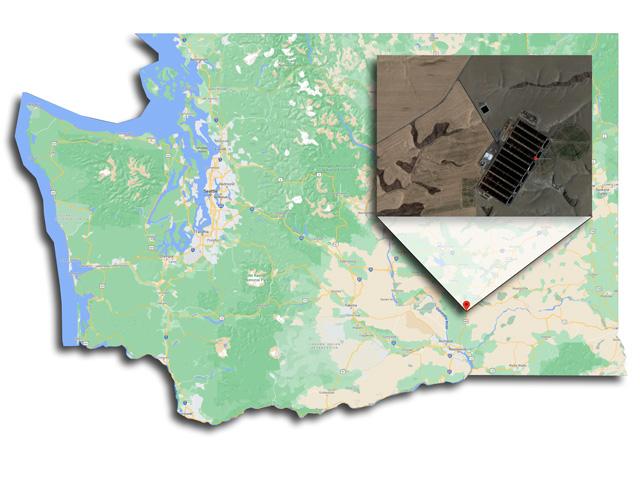WA Rancher Admits 'Ghost-Cattle' Scam
Rancher Cody Easterday Faces Up to 20 Years in Prison, $244M in Restitution on Wire Fraud
LINCOLN, Neb. (DTN) -- A Washington state rancher has pleaded guilty to wire fraud and could face up to 20 years in prison for defrauding Tyson Foods and another unnamed company $244 million in costs for buying and feeding hundreds of thousands of cattle that didn't exist.
The criminal case and connected bankruptcy of Easterday Ranches and Easterday Farms could lead to the liquidation of an extensive family farm operation in eastern Washington involved in cattle feeding as well as 22,500 acres of potatoes, onions, corn and wheat in the Columbia Basin.
Beginning in 2016 and continuing through November 2020, Cody Allen Easterday, 49, of Mesa, Washington, submitted false and fraudulent invoices and other information to Tyson and another company, according to court documents and the U.S. Department of Justice.
The Easterday Ranches, Inc., owner received reimbursement from the companies for the purported purchase and growing cattle the company never actually bought.
As part of the guilty plea, Easterday also agreed to repay $244 million in restitution, according to the DOJ. He is scheduled to be sentenced on Aug. 4.
The Commodity Futures Trading Corp. sued Easterday on Wednesday, alleging his company violated the Commodity Exchange Act and CFTC regulations. The CFTC complaint was filed in U.S. District Court for the District of Eastern Washington.
The CFTC's complaint stated Easterday amassed more than $200 million in losses during a 10-year period trading cattle futures on both his personal and business accounts. Easterday then admitted last fall that he had caused Easterday Ranches to submit invoices for cattle that never existed to cover millions of dollars in those trading losses.
The CFTC complaint seeks restitution, civil penalties, and permanent trading and registration bans on Easterday.
P[L1] D[0x0] M[300x250] OOP[F] ADUNIT[] T[]
On several occasions, according to the CFTC complaint, Easterday carried positions in live cattle futures that exceeded CME exchange-set position limits and "materially overstated" cattle inventory, purchases and sales.
Tyson Fresh Meats sued Easterday Ranches at the end of January, making the allegations.
The Seattle Times reported last month that an audit done by the Washington State Department of Agriculture of brand inspection records found no discrepancies.
CHAPTER 11 BANKRUPTCY
After the Tyson lawsuit was filed, Easterday Ranches filed for Chapter 11 bankruptcy protection on Feb. 1, 2021.
According to the filing in the U.S. Bankruptcy Court for the District of Eastern Washington Easterday lists liabilities and assets of $100 million to $500 million. The company said it has between 200 and 999 creditors, with Tyson Fresh Meats listed as the top creditor at $225 million.
Easterday Farms -- started in 1958 by Cody Easterday's grandparents -- also filed for Chapter 11 bankruptcy protection that same week. Easterday Ranches filed with the court last week seeking approval to sell 22,500 acres of land.
In addition, Easterday purchased a troubled dairy in Morrow County, Oregon, in 2019, housing more than 28,000 cows. The 7,228-acre dairy is not part of the bankruptcy.
In a motion to appoint a trustee in the cases, Tyson said it learned Easterday sold one of its feedlots for $16 million just one week before filing for bankruptcy.
"Of the $15.1 million in sale proceeds that were disbursed, $13 million went directly to affiliates or professionals: only $2.1 million (less than 14%) went to third-party creditors and almost $12 million (close to 80%) went directly to Easterday Farms and other Easterday family-owned entities," Tyson said in its motion.
"In short, Tyson was absolutely justified in fearing that the north lot sale would be used to benefit insiders to the detriment of everyone else."
According to court documents, Cody Easterday used Easterday Ranches to enter into a series of agreements with Tyson and another company to purchase and feed cattle.
As part of the agreements, Tyson and the unnamed second company would provide funds for Easterday to buy and raise cattle.
After cattle were slaughtered and sold at market price, Easterday Ranches would repay the costs advanced and retaining as profit the amount by which the sale price exceeded the sum repaid to Tyson and the second company.
"For years, Cody Easterday perpetrated a fraud scheme on a massive scale, increasing the cost of producing food for American families," Acting Assistant U.S. Attorney General Nicholas L. McQuaid said in a statement.
Todd Neeley can be reached at todd.neeley@dtn.com
Follow him on Twitter @toddneeleyDTN
(c) Copyright 2021 DTN, LLC. All rights reserved.




